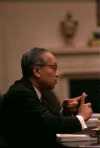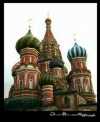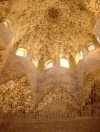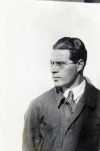 Burmese diplomat U Thant served as UN Secretary-General for ten years. During his first term of service, he played a major role in defusing the Cuban Missile Crisis and ending the civil war in the Congo. He was elected to a second term in 1966, but had less success in dealing with the major crises of this later period, which included the Vietnam War and the Six Day War. On the day of U Thant’s funeral, a group of students stole his coffin. What short-lived crisis did their actions spark? Discuss
Burmese diplomat U Thant served as UN Secretary-General for ten years. During his first term of service, he played a major role in defusing the Cuban Missile Crisis and ending the civil war in the Congo. He was elected to a second term in 1966, but had less success in dealing with the major crises of this later period, which included the Vietnam War and the Six Day War. On the day of U Thant’s funeral, a group of students stole his coffin. What short-lived crisis did their actions spark? Discuss
Source: The Free Dictionary
 Switzerland’s unofficial national flower, Edelweiss, is a perennial alpine plant belonging to the daisy family. The white, woolly, star-shaped bloom grows in rocky limestone areas and high altitudes and is often found in the mountains of Europe and Asia. It is considered a symbol of purity by the Swiss and has been used in traditional folk medicine to fight disease. “Edelweiss,” mistakenly believed by many to be the Austrian national anthem, is a song featured in what popular musical production?
Switzerland’s unofficial national flower, Edelweiss, is a perennial alpine plant belonging to the daisy family. The white, woolly, star-shaped bloom grows in rocky limestone areas and high altitudes and is often found in the mountains of Europe and Asia. It is considered a symbol of purity by the Swiss and has been used in traditional folk medicine to fight disease. “Edelweiss,” mistakenly believed by many to be the Austrian national anthem, is a song featured in what popular musical production?  The economy of Dubai is increasingly dependent on tourism to generate revenue and bring foreign dollars into the emirate, and the three Palm Islands were commissioned to do just that. Shaped like palm trees, these artificial islands are the largest in the world and house luxury hotels, exclusive residential beachside villas and apartments, shopping malls, restaurants, sports facilities, and health spas. What method is used to construct the complex artificial islands?
The economy of Dubai is increasingly dependent on tourism to generate revenue and bring foreign dollars into the emirate, and the three Palm Islands were commissioned to do just that. Shaped like palm trees, these artificial islands are the largest in the world and house luxury hotels, exclusive residential beachside villas and apartments, shopping malls, restaurants, sports facilities, and health spas. What method is used to construct the complex artificial islands?  Read, an Englishwoman who was born in the late 17th century, spent much of her life disguised as a man and working in industries generally reserved for men. She was on a ship bound for the West Indies when it was captured by pirate captain Calico Jack Rackham. Read joined his crew and became one of the most notorious female pirates of the time. When Rackham’s ship was captured and the crew sentenced to death, Read received a stay of execution after she “pled her belly,” a reference to what?
Read, an Englishwoman who was born in the late 17th century, spent much of her life disguised as a man and working in industries generally reserved for men. She was on a ship bound for the West Indies when it was captured by pirate captain Calico Jack Rackham. Read joined his crew and became one of the most notorious female pirates of the time. When Rackham’s ship was captured and the crew sentenced to death, Read received a stay of execution after she “pled her belly,” a reference to what?  Rubies are precious gemstones that range in color from light pink to blood red and are second only to the diamond in hardness. They are found chiefly in Myanmar, Thailand, and Sri Lanka and are classified among the most valuable of gems. The rare star ruby, which shows an internal star-shaped formation when cut into a cabochon, is an example of a gemstone whose value is actually increased by an inclusion. Why can rubies be found beneath building foundations in some Asian countries?
Rubies are precious gemstones that range in color from light pink to blood red and are second only to the diamond in hardness. They are found chiefly in Myanmar, Thailand, and Sri Lanka and are classified among the most valuable of gems. The rare star ruby, which shows an internal star-shaped formation when cut into a cabochon, is an example of a gemstone whose value is actually increased by an inclusion. Why can rubies be found beneath building foundations in some Asian countries?  The fortress of Terezín was constructed in the late 18th century in what is now the Czech Republic. In the early 1900s, it held famed prisoner Gavrilo Princip, who assassinated the Archduke of Austria, causing the outbreak of WWI. The Nazis took control of Terezín in 1940 and quickly turned it into concentration camp called Theresienstadt. The camp was presented to the outside world as a model Jewish settlement, but of the approximately 144,000 Jews sent to Theresienstadt, how many survived?
The fortress of Terezín was constructed in the late 18th century in what is now the Czech Republic. In the early 1900s, it held famed prisoner Gavrilo Princip, who assassinated the Archduke of Austria, causing the outbreak of WWI. The Nazis took control of Terezín in 1940 and quickly turned it into concentration camp called Theresienstadt. The camp was presented to the outside world as a model Jewish settlement, but of the approximately 144,000 Jews sent to Theresienstadt, how many survived?  Red Square, located in Moscow, is one of the most famous city squares in Russia, with a rich history that is reflected in many works of art. After the square was cleared of buildings in 1493, it became Moscow’s primary marketplace as well as the site for various ceremonies, proclamations, and coronations. During the Soviet era, Red Square maintained its significance and was the site of the 1945 victory parade held after the defeat of Nazi Germany. What is the origin of the name “Red Square”?
Red Square, located in Moscow, is one of the most famous city squares in Russia, with a rich history that is reflected in many works of art. After the square was cleared of buildings in 1493, it became Moscow’s primary marketplace as well as the site for various ceremonies, proclamations, and coronations. During the Soviet era, Red Square maintained its significance and was the site of the 1945 victory parade held after the defeat of Nazi Germany. What is the origin of the name “Red Square”?  The Alhambra is a palace and fortress complex built during the Middle Ages by the Moorish monarchs of Granada. It is the finest example of the once flourishing Moorish civilization’s architecture. Its halls and chambers surround a series of open courts, and the interior is adorned with magnificent examples of honeycomb and stalactite vaulting. Detailed geometric designs in marble, alabaster, and carved plaster also decorate the interior. What artist came to study the Alhambra’s tiles in 1922?
The Alhambra is a palace and fortress complex built during the Middle Ages by the Moorish monarchs of Granada. It is the finest example of the once flourishing Moorish civilization’s architecture. Its halls and chambers surround a series of open courts, and the interior is adorned with magnificent examples of honeycomb and stalactite vaulting. Detailed geometric designs in marble, alabaster, and carved plaster also decorate the interior. What artist came to study the Alhambra’s tiles in 1922?  Stainless steel, which was developed in England in 1913, has a high tensile strength and resists abrasion, corrosion, and rust because of its high chromium content. Over 150 grades of this iron-carbon alloy now exist, and it is widely used to make cookware, cutlery, hardware, surgical instruments, watches, appliances, building materials, and industrial equipment. It is also used as a structural alloy in automotive and aerospace assembly. What is the passivation layer?
Stainless steel, which was developed in England in 1913, has a high tensile strength and resists abrasion, corrosion, and rust because of its high chromium content. Over 150 grades of this iron-carbon alloy now exist, and it is widely used to make cookware, cutlery, hardware, surgical instruments, watches, appliances, building materials, and industrial equipment. It is also used as a structural alloy in automotive and aerospace assembly. What is the passivation layer?  Moholy-Nagy was a Hungarian painter, photographer, and designer. His experiments with photograms and kinetic “light space modulators” reflect the way in which his art was influenced by constructivism, an abstractionist movement characterized by the use of industrial materials to create nonrepresentational, often geometric objects. One of his greatest contributions to modern art was his teaching, which deeply influenced American commercial and industrial design. Where did he teach in the 1920s?
Moholy-Nagy was a Hungarian painter, photographer, and designer. His experiments with photograms and kinetic “light space modulators” reflect the way in which his art was influenced by constructivism, an abstractionist movement characterized by the use of industrial materials to create nonrepresentational, often geometric objects. One of his greatest contributions to modern art was his teaching, which deeply influenced American commercial and industrial design. Where did he teach in the 1920s?